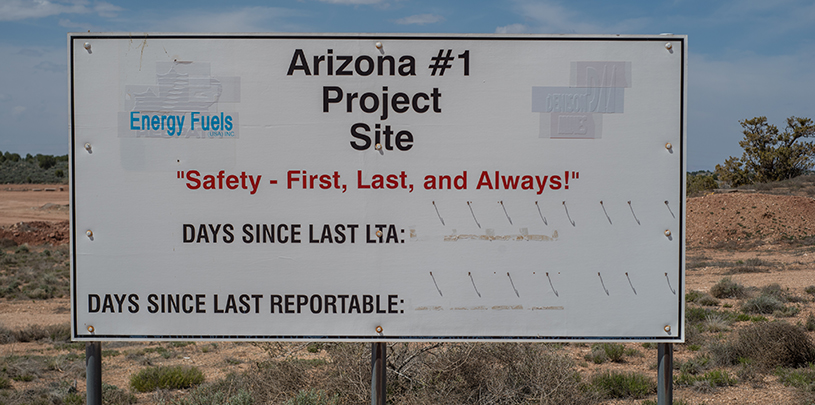
 by Roger Clark, Grand Canyon Director
by Roger Clark, Grand Canyon Director
Three uranium mines near the Grand Canyon are seeking air quality control permit renewals that would allow them to pollute the environment around Grand Canyon National Park. Ask Arizona regulators to take action ›
Energy Fuels Resources, the company that owns most of the uranium mines around the Grand Canyon, as well as the nation’s only operating uranium mill, is asking the Arizona Department of Environmental Quality (ADEQ) to renew air quality control permits—more accurately described as “pollution permits”—for the Canyon, AZ1, and EZ uranium mines. All three mines are located within watersheds that drain directly into Grand Canyon National Park and threaten water, air, and other important resources of the greater Grand Canyon region, including soil, wildlife, and sacred Native American sites. According to Energy Fuels, recent core drilling at Canyon uranium mine reveals deposits with uranium ore grades as high as 6.88 percent. Such high concentrations of uranium amplify the risk of groundwater contamination, air pollution, and radiation. The ADEQ will accept public comments on the permit renewals until August 30, 2016 and will host three public hearings in northern Arizona.
Air quality control permits for uranium mines in Arizona come up for renewal only every five years, so the public will not have another chance to weigh in on the permits for these mines before 2020. On August 15, 2016, the Trust and partners submitted detailed comments urging the ADEQ to fulfill its responsibility to protect public health and the environment in Arizona by denying all three permits.
Require a full assessment of the cumulative effects of these mines, including all pathways of pollution and the human and ecological harms of radon gas, radiation, and radioactive dust in the Grand Canyon region;
Incorporate new information about uranium toxicity and the potential impacts of radioactive dust dispersal on surrounding land, water, and biological communities within Grand Canyon watersheds discovered since the permits were last renewed in 2010;
Conduct systematic dust, soil, and water monitoring at the mines and along all transportation routes until sampling confirms that the mines and transportation routes are decontaminated;
Require mine owners to pay for all monitoring and decontamination costs;
Consider the environmental justice implications of permitting trucks to haul uranium ore and spread radioactive dust through Navajo and other Native American communities, where the deadly legacy of uranium continues to take its toll after decades of contamination;
Require an air quality control permit renewal for Pinenut Mine (permit number 62876) until comprehensive monitoring confirms that all radioactive material has been removed and that dust and other fugitive air emissions are no longer detected from the site, based on new evidence of permanent contamination at Kanab North, Pigeon, and other recently closed uranium mines.
A small victory in the legal case challenging Daneros uranium mine, near Bears Ears National Monument.
Read MoreGroundwater pumping at a uranium mine near the Grand Canyon will affect the canyon's springs, scientists says.
Read MoreA rally in Salt Lake City followed by a spiritual walk in White Mesa demonstrate the Ute community's determination to see uranium mill close.
Read More